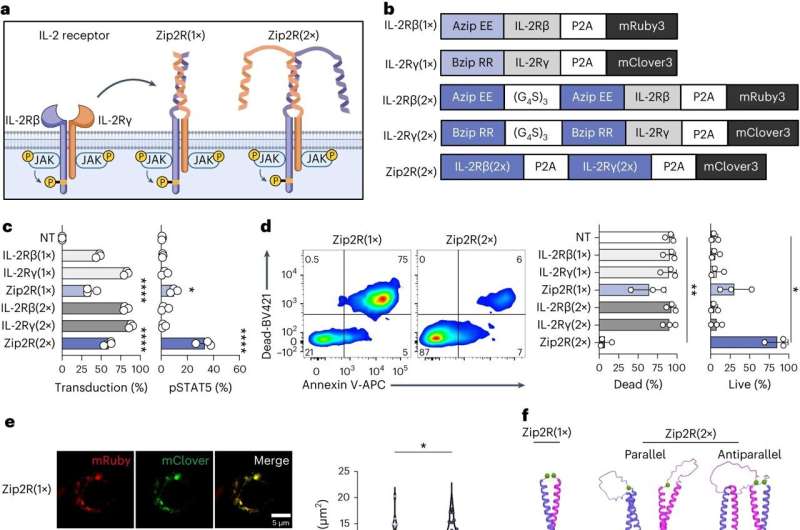This article has been reviewed according to Science X's editorial process and policies. Editors have highlighted the following attributes while ensuring the content's credibility:
fact-checked
trusted source
proofread
Modular chimeric cytokine receptors improve CAR T-cell therapy for solid tumors

Immunotherapy using modified chimeric antigen receptor (CAR) T cells has greatly improved survival rates for pediatric patients with relapsed and recurrent leukemia. However, these therapies are not as effective in treating solid tumors and can have significant toxicity. Findings from St. Jude Children's Research Hospital showed that adding a modular chimeric cytokine receptor to CAR T cells increased their efficacy in multiple solid tumor models. The study was published today in Nature Biomedical Engineering.
"We designed modular chimeric cytokine receptors and showed that they improve CAR T cells," said first author Matthew Bell, Ph.D., formerly of the St. Jude Department of Bone Marrow Transplantation and Cellular Therapy. "From our models, this technology has the potential to broadly improve CAR T–cell therapy for solid tumors and brain tumors."
CAR T cells are a patient's own immune cells modified to target and kill cancer cells. Solid tumors generate anti-immune signals that turn CAR T cells off, rendering the treatment less effective. To—address this problem, scientists have combined CAR T cells with the injection of cytokines, which can cause significant unintended toxicities. The St. Jude system allows scientists to deliver the pro-immune signaling of cytokines only to the CAR T cells, eliminating systemic toxicity.
"Our system limits the effect of the cytokine signal to only engineered cells," Bell said. "In turn, this reduces the chance of cytokine-related toxicity, and it provides a signal that these CAR T cells need to function effectively in a suppressive tumor microenvironment."
A modular system benefits the antitumor activity of CAR T cells
"Our modular receptor system is an approach to improve current CAR T–cell therapy for solid tumors where the treatment has not been as effective as expected in early-phase clinical trials," said corresponding author Stephen Gottschalk, M.D., St. Jude Department of Bone Marrow Transplantation and Cellular Therapy. "Our initial results showing improved tumor control in multiple model systems are promising."
The St. Jude group replaced the extracellular domain of different cytokine receptors with leucine zippers to create constitutively active receptors. CAR T cells expressing any of these chimeric cytokine receptors had superior antitumor activity against multiple types of cancer in both cell lines and mouse models compared to conventional CAR T cells. While the chimeric cytokine receptors give a constant "on" signal to the CAR T cells, they do not induce unspecific CAR T–cell proliferation.
"We were happily surprised that these receptors turn on cytokine pathways just a little bit," Gottschalk explained. "In the absence of tumor cells, the receptors improved CAR T–cell survival without expansion. To optimize the design and characterize our chimeric cytokine receptors, we worked closely with several St. Jude investigators, including Giedre Krenciute, Jiyang Yu, Junmin Peng, Hongbo Chi and Madan Babu."
"Ultimately, we found a way to enhance the antitumor activity of CAR T–cells that is likely more effective and safer than injecting cytokines," Bell concluded.
More information: Bell, M. et al, Modular chimeric cytokine receptors with leucine zippers enhance the antitumour activity of CAR T cells via JAK/STAT signalling, Nature Biomedical Engineering (2023). DOI: 0.1038/s41551-023-01143-w www.nature.com/articles/s41551-023-01143-w




















